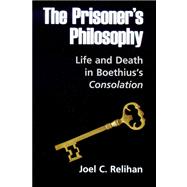
Note: Supplemental materials are not guaranteed with Rental or Used book purchases.
Purchase Benefits
What is included with this book?
| Preface | ix | ||
| Texts, Translations, Terminology, Dramatis Personae | xiii | ||
| CHAPTER ONE The Ironic Consolation and Its Reception | 1 | (14) | |
| CHAPTER TWO Two Digressions and a Pointed Conclusion | 15 | (19) | |
| CHAPTER THREE Universality and Particularity | 34 | (13) | |
| CHAPTER FOUR Consolation and the Genre of Consolation | 47 | (12) | |
| CHAPTER FIVE Death and Meditation | 59 | (16) | |
| CHAPTER SIX The Odyssey of Consolation | 75 | (18) | |
| CHAPTER SEVEN Models and Rewritings | 93 | (18) | |
| CHAPTER EIGHT The Menippean Boethius in the Personification Allegories of the Middle Ages, by William E. Heise | 111 | (16) | |
| CHAPTER NINE The Wisdom of Boethius | 127 | (10) | |
| APPENDIX 1. Latin Texts: Consolation 4.1; 5.1; 5.6.44-48 | 137 | (4) | |
| APPENDIX 2. Bocthius, In de interpretatione2 3.9, 221.27-227.12 Meiser | 141 | (6) | |
| APPENDIX 3. Maximian, Elegy 3 | 147 | (8) | |
| APPENDIX 4. Agathias Scholasticus, Greek Anthology, 11.354 | 155 | (3) | |
| Notes | 158 | (48) | |
| References | 206 | (11) | |
| Index | 217 |
The New copy of this book will include any supplemental materials advertised. Please check the title of the book to determine if it should include any access cards, study guides, lab manuals, CDs, etc.
The Used, Rental and eBook copies of this book are not guaranteed to include any supplemental materials. Typically, only the book itself is included. This is true even if the title states it includes any access cards, study guides, lab manuals, CDs, etc.